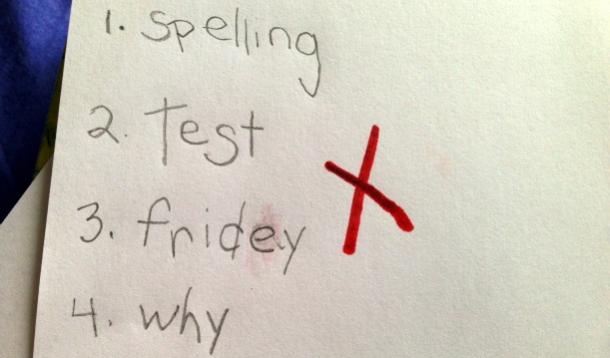
Ah, the dreaded spelling test – for some kids, those who excel at memorization, the Friday spelling quiz is a chance to shine. For other kids, the Friday spelling kids brings anxiety, tears, and creates the mistaken belief that a child is a “poor speller.” Some parents question the validity of the traditional spelling program that hasn’t changed since their own school experience; others raise a cry of dismay when a teacher abandons this dated practice.
And who is right? Is there a point to the traditional spelling program? Does it even make a difference in a student’s ability to spell?
Spelling is important. Learning to spell supports strong reading skills and fluent writing skills. As an avid wordsmith, I immediately lose faith in a writer whose work is littered with spelling and grammar errors. I have a very difficult time reading things without automatically editing them. I often have friends and family ask me to look over their written work – and yet, in my school years, I was labelled a “bad speller.” This confused my parents and teachers, as I was very strong in all other areas of the language curriculum.
It turns out I was actually a bad memorizer. I didn’t perform well on cramming unrelated word lists into my brain and regurgitating them under a test situation. I would have done well with word study – a different approach to a spelling program that focuses on students interacting with words in meaningful ways to recognize patterns and extrapolate spelling rules.
In my experience as an educator, the traditional memorize-for-the-quiz method is very limited. Often kids either already know how to spell most of the list that is assigned to them on Monday, or they manage cram it in for the Friday quiz, only to misspell the word again in their writing the following week. And there are a handful of kids who don’t succeed at the test, leading them to doubt their abilities and lower their self-esteem.
The research shows that students should be encouraged to use inventive spelling – to sound out words the best they can and write what they hear, even if it isn’t close to the actual spelling. Also, kids need to discover word patterns. Activities like sorting words into groups based on patterns and similarities help kids internalize spelling rules.
To really start to understand and use words correctly (and spell words correctly), students need to have meaningful interactions with words. Writing list word three times in rainbow colours is not a meaningful interaction; nor is saying a word, covering it and spelling it aloud. Reading words often and in a variety of contexts is important; I believe in kids reading as much as possible without it turning into a chore (preserving a love of reading in children far outweighs any benefits of forced reading time that damages the love of books).
I think students retain lessons better when there is a sense of fun and discovery embedded into them. Playing with words, manipulating letters to turn one word into a new word, learning where words come from and understanding the meanings of words gives students a much better chance at cracking the code that is our language than simply learning word lists by rote.
There are many educators who continue to use the traditional spelling program, and I suppose there is some merit to learning to memorize – although in my opinion, such merit pales considerably next to more in-depth, meaningful learning. And there are teachers who insist those Friday spelling quizzes are necessary to assess their students’ spelling ability – but I think that aptitude is much better assessed through written work.
To me, the age-old spelling program is tired waste of time, and for some students, may even be detrimental. Yes, absolutely, it is important to teach spelling, but isn’t it time we bring our teaching methods into the 21st Century?
![]() RELATED: Is There Even A Point To Report Cards?
RELATED: Is There Even A Point To Report Cards?